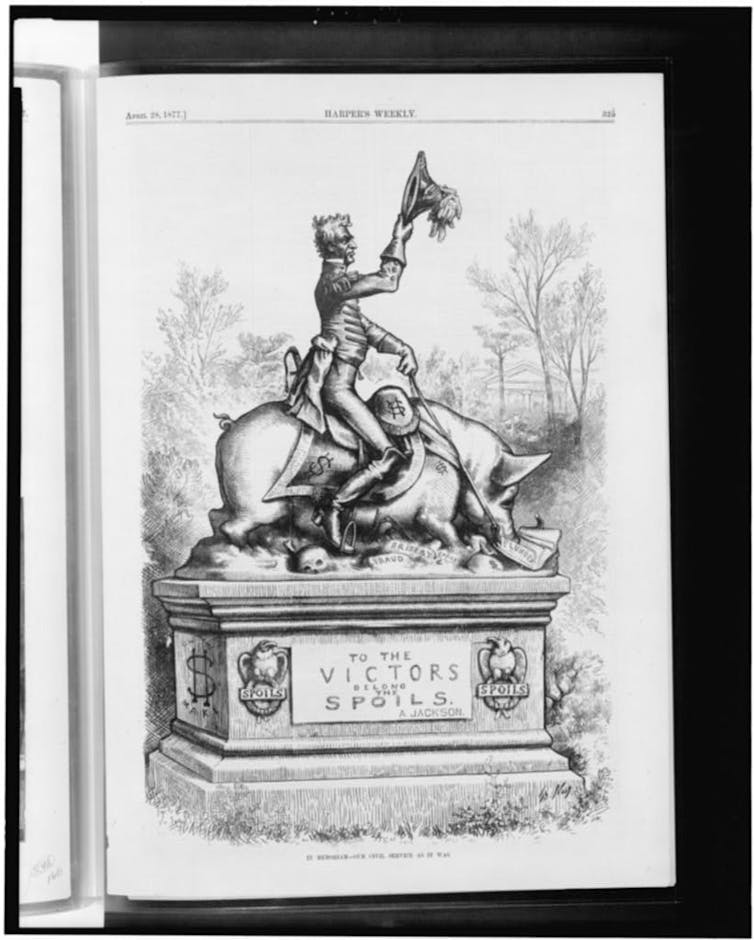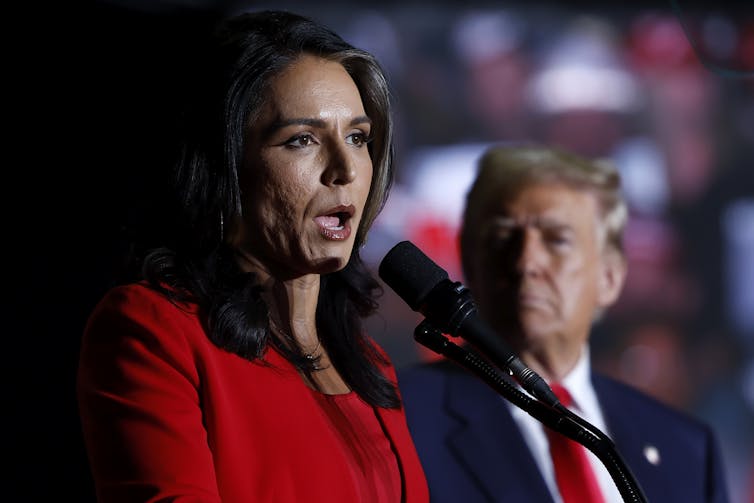The brand new U.S. Senate is getting right down to enterprise, and one in every of its first duties will likely be to think about Donald Trump’s nominations to federal workplace.
Trump himself has advised his choice for recess appointments for Cupboard members. This could keep away from the normal affirmation hearings within the Senate, that are more and more polarizing, drawn out and partisan.
Discussions of the nominations have included many references to the founders and the method they supposedly devised for confirming nominees.
But the founders, actually, had little or no to say on the topic. The Structure states that the president “by and with the Advice and Consent of the Senate, shall appoint Ambassadors, other public Ministers and Consuls, Judges of the supreme Court, and all other Officers of the United States.”
That’s it. The Federalist Papers, the editorials and pamphlets arguing in favor of ratification that so many college students learn in highschool and school, didn’t add a lot else on the subject of federal appointments. And the founders didn’t discover the topic intimately in their very own correspondence.
A listing of nominations that Thomas Jefferson despatched to the Senate on Feb. 6, 1809, together with one nominating Joseph Storer of Massachusetts to be ‘Collector of the district, and Inspector of the revenue for the port of Kennebunk.’
The Thomas Jefferson Papers on the Library of Congress
Essential Senate perform
I’m a historian who has spent practically twenty years exploring the federal appointment course of. I lately launched Making a Federal Authorities, 1789-1829, a significant digital venture that reconstructs the federal authorities throughout its first many years.
The Senate thought-about greater than 5,000 nominations to federal civil workplace from 1789-1829, and I’ve combed by the correspondence of the early federal administrations to know their strategy to this significant Senate perform.
The primary presidents had been adamant that the affirmation processes ought to be public and clear, with Senate oversight. The early Senate was eager to protect its energy over appointments however afforded the president broad discretion in constructing the chief department.
What this meant was that “advice and consent” was not decreed as a set of formal guidelines. Moderately, recommendation and consent took type in follow and emerged from the day-to-day wants of presidency.
The founders’ mannequin: Clear inefficiency
George Washington, the primary president of the US, operated from the idea that the president and the Senate ought to be actively concerned in approving even the lowest-level officers.
After early nominations for the likes of Thomas Jefferson, the primary secretary of state, and Alexander Hamilton, the primary secretary of the Treasury, Washington personally nominated a whole lot of customs collectors, low-ranking officers within the navy and territorial officers. One of many first of those got here on Aug. 3, 1789, when Washington dispatched the names of 139 nominees for “Collectors, Naval Officers and Surveyors for the Ports.”
There was barely a federal workplace that Washington didn’t suppose the Senate ought to take into account. His solely exceptions had been clerks, postmasters and enlisted personnel within the navy.
The Senate itself was smaller again then, starting from 22 members from 11 states when Washington was inaugurated in 1789 to 48 members from 24 states when John Quincy Adams left workplace in 1829. There have been no hearings, nor a lot in the best way of formal vetting. Moderately, the Senate mentioned nominations amongst themselves, usually voting the identical day.
Recess appointments uncommon
This collaborative system was designed to exemplify checks and balances. However it was additionally an inefficient one which consumed the president’s and senators’ time and power.
The method was particularly busy at the beginning of a congressional time period, and the Senate Govt Journal – the one detailed account of early Senate proceedings – reveals barely per week glided by with out contemplating nominations.
Washington’s successors likewise dispatched hundreds of names to the Senate on lists usually written in their very own hand. The Senate responded by devoting a lot of its each day agenda to contemplating these nominees.
And the outcomes inform a narrative: Simply as presidents believed that the Senate have to be concerned with constructing the federal workforce, senators apparently believed that presidents ought to have broad discretion. They confirmed over 90% of the nominations they acquired from 1789-1829, in line with my evaluation.
This remained the case even in the course of the first interval of divided authorities from 1801 to 1802. The Federalist majority within the Senate persistently accepted President Jefferson’s nominations, regardless that he was from the opposing Republican Social gathering.
Jefferson initially noticed appreciable partisan benefit to federal appointments. In 1801-1802, for instance, he eliminated 146 customs officers he believed had been Federalists and eagerly sought Republicans to take their place. However Jefferson additionally stored on quite a few officers appointed by his Federalist predecessors as a result of he valued their competence – and institutional stability.
From the 1790s by the 1820s, these early presidents hardly ever used recess appointments, my analysis reveals. After they did, it was primarily to fill vacancies created by loss of life or resignation, after which they rapidly submitted formal nominations as soon as the Senate returned.
The fashionable mannequin: A divided system

A political cartoon from 1877 displaying a statue of Andrew Jackson sitting on a hog atop a tomb, engraved with ‘To the victors belong the spoils − A. Jackson.’
Thomas Nast, Harpers Weekly/Library of Congress Prints and Images Division
The U.S. started shifting from this comparatively constructive give-and-take among the many founders within the late 1820s.
When Andrew Jackson got here into workplace in 1829, he proclaimed that to the victor go the spoils, and that included appointments. He handled appointments as a reward for political allies, irrespective of their {qualifications}.
Jacksonian patronage turned the goal for progressive reformers within the late nineteenth century. They claimed that the spoils system produced a federal system that employed unqualified workers and rewarded political allies slightly than serving most people. They believed civil service reform would produce an efficient, environment friendly and nonpartisan federal authorities.
These reforms, mixed with a rising federal authorities that contained too many workplaces for the Senate to think about, laid the groundwork for right this moment’s construction by which Senate affirmation is reserved for higher-level workplaces, most of which change with every presidential administration.
Overwhelming majority nonetheless accepted

Former U.S. Rep. Tulsi Gabbard campaigns with Donald Trump on Oct. 22, 2024, in Greensboro, N.C. Trump has chosen Gabbard as his director of nationwide intelligence.
Anna Moneymaker/Getty Photos
Reserving recommendation and consent to high-level positions has shifted the main target of the Senate and the eye of the general public solely to high-value workplaces and nominees with larger political expertise.
Broadcasting affirmation hearings, a follow that started within the Eighties, has solely elevated the sense that they’ve turn into political theater. It has made the method extra clear but additionally created larger alternatives for all concerned to transform hearings into political grandstanding.
But for all these latest developments, the overwhelming majority of nominations are nonetheless accepted. That is very true for non-Cupboard and lower-level posts.
For positions comparable to U.S. legal professional, assistant secretary of state or director of the Bureau of Land Administration, presidents normally submit nominations to the Senate when the Senate is in session. The Senate in flip normally confirms with spirited dialogue however restricted opposition.
All presidents have made use of momentary appointments, and a few nominations generate main public controversies, however they’re the exceptions that show the rule.
And the method of nominating folks for these workplaces stays a outstanding hyperlink to the earliest years of the republic.
The foundations, nevertheless, are altering.
The primary Trump administration used momentary appointments way more usually than his predecessors. And he might do the identical in his second time period.
In the meantime, Republicans within the Senate confronted criticism for dragging their ft on nominations to essential civil and navy workplaces in the course of the Obama and Biden administrations.
These latest developments constituted breaks from long-standing practices and profound breaks from how the Founding Fathers imagined the method of recommendation and consent.



